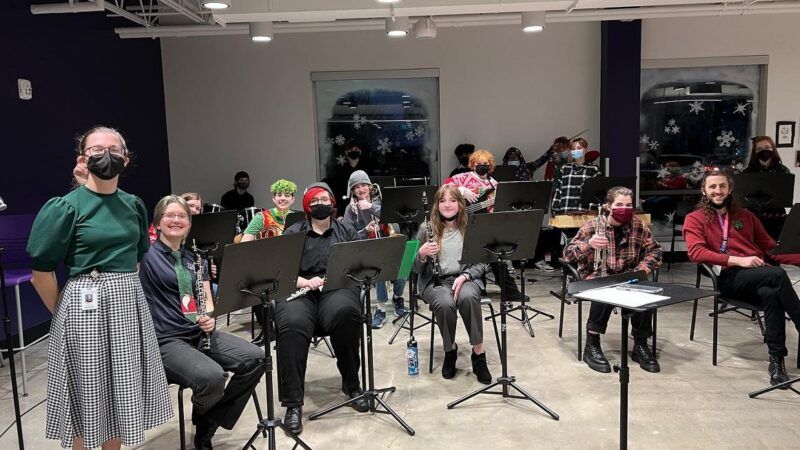An LGBT-Friendly Charter School in the Heart of Alabama Shows the Power and Flexibility of School Choice
But culture war political fights over race and sex education threaten their educational freedom.

For an excellent example of how charter schools can reach students who struggle in standardized public school environments, head to Homewood, Alabama, a suburb of 25,000 people south of Birmingham.
There you'll find Magic City Acceptance Academy, a public charter school that opened its doors last August after struggling for a year to get official permission to open. The mission of the academy, in its own words, is to facilitate "a community in which all learners are empowered to embrace education, achieve individual success, and take ownership of their future in a safe, LGBTQ-affirming learning environment."
Yes, an LGBT-friendly charter school has launched in Alabama and serves students from sixth through 12th grade. It currently has 232 students drawn from all over the greater Birmingham area. Registration will be opening soon for the next school year and founder and Principal Michael Wilson tells Reason he's hoping for between 325 and 350 students.
The existence of Magic City Acceptance Academy is important to note during National School Choice Week, because many critiques of charter school systems involve accusing charter schools of discrimination and catering to wealthy or privileged communities. The reality is that many charter schools cater to minority students and those with special needs. The list of charter schools focusing on assisting LGBT students is small so far (the National Alliance for Public Charter Schools notes six of them). But charter schools are a potential way of extricating students from oppressive traditional public school environments.
Students do not actually have to be LGBT in order to attend the school. Rather, the goal, Wilson explains, is to create a friendly and welcoming environment for any child who is being bullied in traditional schools and is not getting the help or support he or she needs.
"There are some pretty horrific things that go on in schools," Wilson says. "It may be about the student's place on the LGBTQ spectrum, but may be also because of autism or their skin color or because they're a child of immigrants. They're not comfortable where they are."
And so, on top of the typical education the academy provides that complies with state standards, the school offers wellness programs and mental health counseling, working with parents to help connect to health services as needed.
Schools have, quite obviously, become a political battleground over what teachers are allowed to say to students on issues of race, and new proposed laws in states like Florida and Oklahoma are attempting to censor how schools educate students about sexual orientation. In Alabama, several bills have been introduced that would attempt to ban certain types of race and sex discussions that are associated with critical race theory. Alabama lawmakers want to specifically ban schools from teaching "that this state or the United States is fundamentally racist or sexist."
Social justice is explicitly part of Magic City Acceptance Academy's program, and parents entering their students into the school know that progressive concepts of justice and equity will be part of the child's education. Given, then, that attendance in a charter school is entirely voluntary, one might assume that they would or should have the freedom to maintain programs that the parents support. But because charter schools are public schools, these political fights may end up hitting charter schools anyway.
Even as Texas Gov. Greg Abbott declared his support for National School Choice Week this week, Essence Preparatory, a proposed charter school in San Antonio, Texas, was forced to change components of its anti-racist education model in order to comply with a law passed last year (which Abbott signed) that forbids schools from teaching that "slavery and racism are anything other than deviations from, betrayals of, or failures to live up to the authentic founding principles of the United States." The aforementioned Oklahoma bill would ban school libraries from including books that focus on LGBT subjects and explicitly targets public charter schools as well.
Wilson is obviously not a fan of politicians undermining school choice by pushing their agendas onto charter schools.
"Critical race theory has nothing to do with hate," he says. "You can gloss over [racism] as most history books do or we can teach the truth. And we believe in teaching the truth. And it's not like we're saying it's their fault. Through the learning process, they become better adults with more understanding."
Leaders within the charter movement are watching how this fight is playing out, and it's not yet entirely clear how much it's going to affect what they're allowed to teach.
"The controversies surrounding CRT and its intersection with what can or cannot be taught in public schools is not yet a matter of settled law," Nina Rees, president and CEO of the National Alliance for Public Charter Schools, tells Reason in an emailed statement. "It is evolving in real time and we are watching this evolution carefully. In [the Essence Preparatory] case, Texas law may supersede the autonomy of the charter school."
"With that said, we firmly believe in protecting charter schools from new rules and regulations that curtail their freedom to innovate (especially in matters related to curricula and pedagogy)," Rees continues. "These efforts, if taken to scale, greatly harm the school choice movement which is based on trusting families with the right to select a school that fits their needs."
School choice should mean that there's space for schools like Magic City Acceptance Academy and Essence Preparatory, should parents and students agree those environments are what they want. Banning the teaching of certain subjects there does not align with conservatives and Republicans who say they support school choice but then support the censorship of controversial ideas.


Show Comments (108)